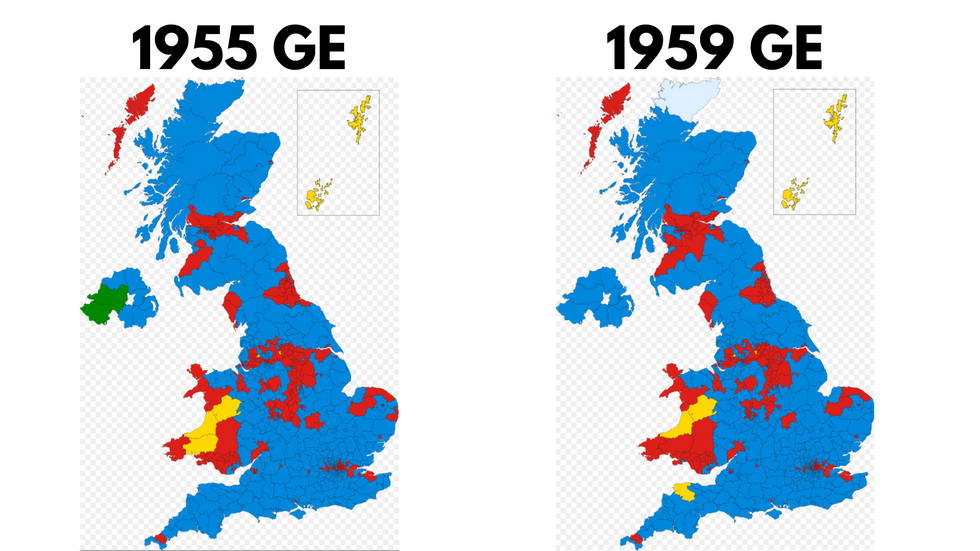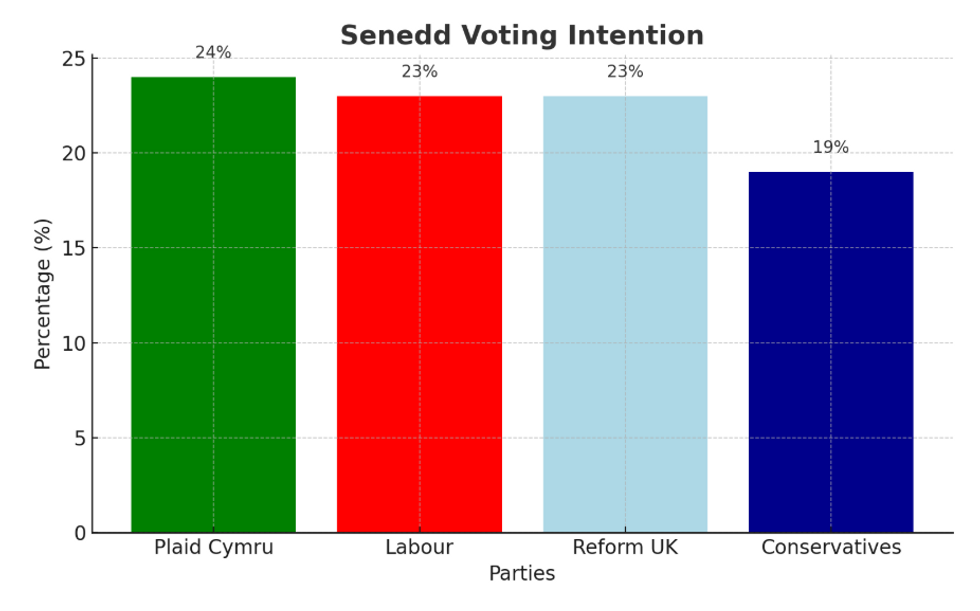It has been 114 years since any political party other than Labour won a majority in Wales.
The last time Labour did not win the most seats in Wales in a General Election was 1910 when Herbert Asquith’s Liberals scooped the most seats.
Back then, women could not vote, the Titanic had not been built, films were silent, the British Empire covered a quarter of the globe and television hadn’t been invented.
Ever since the Welsh public have backed Labour overwhelmingly, electing anyone with a red rosette for 28 consecutive General Elections, an extraordinarily long period of dominance.
Despite a century of effort, rival parties were unable to dent Labour’s grip of the country.
But in what would be the biggest political shakeup in two generations, a party other than Labour might be about to win Wales. Reform UK.
Reform has been steadily gaining popularity in Wales, with poll after poll putting Nigel Farage’s party in second place ahead of the Tories.
Last week a UK-wide poll by Find Out Now pollsters put Labour third with just 23 per cent of the vote.
The Conservatives topped the poll on 26 per cent with Reform a close second on 24 per cent.
Respected pollsters ElectionMapsUK extrapolated the polling to make an electoral map of Britain.
It projected Reform to win 12 seats in Wales, one more than Labour on 11 and ahead of the Tories on seven and Plaid Cymru on three.
Explore which seats are projected to go to Reform
While polls do not predict the future and merely record a snapshot of public perception on a certain day, the results are deeply worrying for Keir Starmer.
In July this year, his party won 27 of 32 available seats in Wales. The Conservatives and Reform won zero.
To lose his ‘Welsh wall’ would be nothing short of disaster, an unwanted ‘first’ bucking 100 years of political history, an unprecedented reverse in fortunes.
For Reform, the poll is nothing short of a triumph. Commentators have highlighted that if the projection were to come true, Reform would have achieved what other opposition parties have been trying to do for over 100 years.
The closest a party has come to toppling Labour in Wales was Thatcher’s landslide in 1983. Labour won 20 Welsh seats that year, six more than the second place Tories on 14.
Apart from Boris Johnson’s 2019 victory when the Conservatives matched Thatcher’s seat haul, Labour has enjoyed long periods of total ascendancy.
This included Tory glory years in the 1950’s when Eden and Macmillan swept to power taking much of the country with them, but not Wales.

1955/1959 General Election Results show how Wales has bucked UK-wide trends
Election Maps
It says much about how unpalatable the Tory brand is in Wales that since Thatcher, the Tories have been beaten by Plaid Cymru or the Lib Dems to second place in four of nine General Elections.
So why do Welsh voters appear to be abandoning the habit of a lifetime?
Commentators point to a crisis-ridden NHS with some of the worst waiting times in Britain, the lowest educational ranking of the home nations and Vaughan Gething’s disastrous 118-day premiership of Wales’ regional parliament the Senedd.
This goes without mentioning Labour’s attack on farmers from Westminster, a national policy but one that has been supported by Wales’ First Minister Eluned Morgan.
Wales, a proud agricultural country famous for its beef and lamb, has reacted furiously to the tax with tractors blockading Labour’s recent conference in Llandudno in November.
Some voters have even pointed to the doldrums Welsh rugby finds itself in as a potential factor. The national side didn’t record a win in 2024, something that hasn’t happened since 1937.
And where Labour is suffering, Reform looks to gain. The party has been focusing efforts on Wales, holding a slick party conference in Newport’s Celtic Manor hotel.
Aiding Reform is the turmoil the Welsh Conservatives find themselves in after the resignation their leader Andrew RT Davies last week.
All of this has translated into a huge poll boost for non-establishment parties like Reform, but also Plaid Cymru.
A recent Senedd poll put Plaid Cymru as the biggest party, one percentage point ahead of Reform and Labour.

Senedd voting intention, carried out by YouGov for ITV Wales and Cardiff University’s Wales Governance Centre
ChatGPT/GB News
But with Reform’s popularity concentrated in the South Wales Valleys where most of Wales’ population lives (compared to Plaid Cymru’s in mid and north Wales), it is Farage’s party who are set to benefit most.
The poll shows the populist party overturning several healthy Labour majorities between 5,000 to 10,000 votes.
These majorities were won off the back of historically low turnouts, however. Wales’ turnout was just 56 per cent in the General Election.
Commenting on the poll, a Reform UK spokesman said: “Reform has all the momentum in Welsh politics.
“Whilst the Labour and the Tories chop and change leaders, taking their eye off the Welsh people’s priorities, we are building a team to offer real change in Wales.
“Labour and the Tories have failed Welsh people in both Cardiff Bay and Westminster. The people of Wales want real change in 2026 and that is just what we plan to offer them. Wales needs Reform.”
Welsh Labour declined to comment.
Of course, there isn’t another General Election due until 2029.
But Senedd elections are due in May 2026. Given recent polling, it is perhaps unsurprising Farage has already labelled them as his ‘number one priority’ that year.
LATEST FROM MEMBERSHIP:
List of Welsh Constituencies Reform is set to snatch according to latest poll:
Rhondda and Ogmore
Merthyr Tydfil and Aberdare
Neath and Swansea East
Pontypridd
Caerphilly
Torfaen
Newport West and Islwyn
Alyn and Deeside
Bridgend
Llanelli
Bangor Aberconwy
Montgomeryshire and Glyndwr
Wales General Election Results since 1979:
1979
Labour 22, Conservatives 11, Plaid Cymru 2
1983
Labour 20, Conservatives 14, Alliance/Plaid Cymru 2
1987
Labour 24, Conservatives 8, Alliance/Plaid Cymru 3
1992
Labour 27, Conservatives 6, Plaid Cymru 4
1997
Labour 34, Plaid Cymru 4, Liberal Democrats 2
2001
Labour 34, Plaid Cymru 4, Liberal Democrats 2
2005
Labour 29, Liberal Democrats 4, Conservatives/Plaid Cymru 3
2010
Labour 26, Conservatives 8, Lib Dem/Plaid Cymru 3
2015
Labour 25, Conservatives 11, Plaid Cymru 3
2017
Labour 28, Conservatives 8, Plaid Cymru 4
2019
Labour 22, Conservatives 14, Plaid Cymru 4
2024
Labour 27, Plaid Cymru 4, Liberal Democrat 1
December 2024 projection
Reform 12, Labour 11, Conservatives 7